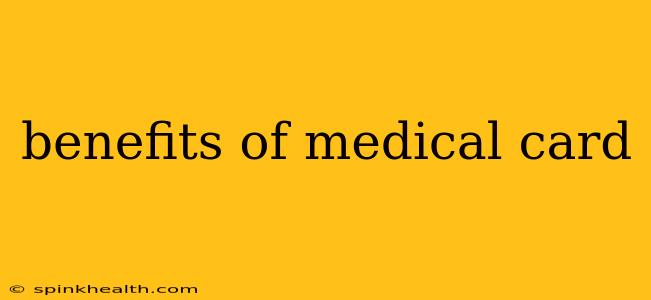The Unexpected Perks of a Medical Card: More Than Just Healthcare
Imagine this: You're suddenly faced with a medical emergency – a nasty fall, a sudden illness, or a chronic condition flaring up. The last thing on your mind is the cost. That's where the power of a medical card comes in. It's more than just a piece of plastic; it's a safety net, a financial buffer, and a pathway to better health. But what are the real benefits, beyond the obvious? Let's delve deeper.
What are the different types of medical cards?
This is a crucial question, as the "benefits" vary wildly depending on the type of medical card you possess. We're talking about everything from basic insurance plans to comprehensive health coverage, and even specialized cards for specific conditions. Some common types include:
- Health Insurance Cards: These are issued by insurance providers and offer coverage for a wide range of medical expenses, from doctor visits and hospital stays to prescription drugs and certain types of therapies. The benefits depend heavily on your specific plan.
- Medicare Cards: In many countries, including the US, Medicare is a government-funded program providing healthcare for senior citizens and certain individuals with disabilities. It has its own set of benefits and limitations.
- Medicaid Cards: Medicaid is another government program, focused on low-income individuals and families. It provides subsidized healthcare, again with its own unique rules and coverage options.
- Membership Cards for Discounted Healthcare: These aren't insurance, but offer negotiated discounts on services with participating providers. They're often useful for routine care but may not cover emergencies or major procedures.
Does a medical card cover all medical expenses?
Unfortunately, the simple answer is no. Even the most comprehensive medical cards typically have limitations. These can include:
- Co-pays and Deductibles: Many plans require you to pay a certain amount upfront (deductible) before coverage kicks in, and then contribute a smaller fee (co-pay) for each visit or service.
- Excluded Services: Certain procedures, treatments, or medications might not be covered under your specific plan. It's vital to carefully review the details of your policy.
- Out-of-Network Providers: If you see a doctor or use a facility not included in your plan's network, you may face higher out-of-pocket costs.
How can I choose the right medical card for my needs?
Choosing the right medical card depends entirely on your individual circumstances and healthcare needs. Consider these factors:
- Your Budget: Insurance premiums, deductibles, and co-pays can significantly impact your finances.
- Your Health Status: If you have pre-existing conditions, you'll need a plan that adequately covers those needs.
- Your Lifestyle: Do you frequently visit the doctor? Do you take prescription medications regularly? Your needs will influence the level of coverage you require.
What are the financial benefits of having a medical card?
The most significant benefit is the financial protection it provides. Without insurance, even minor medical issues can quickly spiral into massive debt. A medical card can:
- Reduce Out-of-Pocket Expenses: By covering a significant portion of your medical bills, it drastically lowers your financial burden.
- Prevent Medical Bankruptcy: In many cases, it can prevent you from accumulating insurmountable debt due to unforeseen medical expenses.
- Offer Peace of Mind: Knowing you have a safety net can significantly reduce stress and anxiety related to healthcare costs.
In conclusion, a medical card offers far more than just access to healthcare; it offers peace of mind, financial stability, and the ability to prioritize your health without the crippling weight of potential costs. Understanding the different types and carefully choosing the right plan are crucial steps towards securing your financial and physical well-being.

